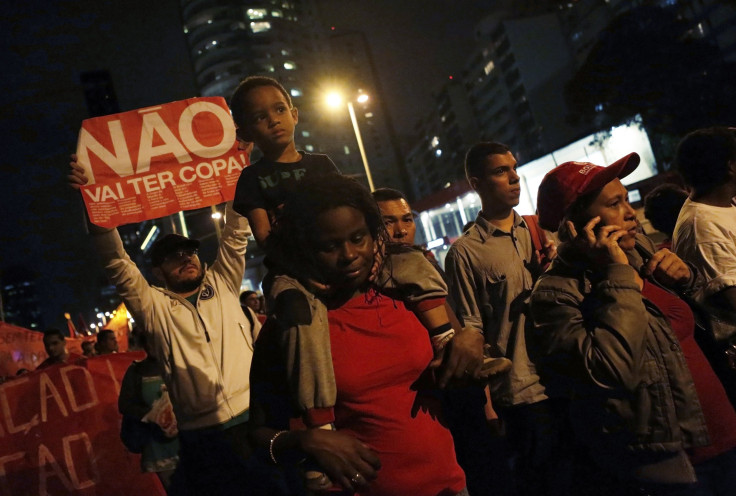No To The Cup: Homeless Workers' Association Leads 20,000 People In Sao Paulo To Demonstrate Against World Cup Costs

Brazil has heard it time and again: “We do not want the World Cup.” Brazilians from all walks of life, from students to bus drivers to doctors, have already delivered the message en masse to the rest of the country in the past year, and yesterday, it was the homeless population's turn.
The Movimento dos Trabalhadores Sem-Teto (Homeless Workers' Movement, or MTST) took to the streets of São Paulo on Thursday as they demanded answers from the government about how public funds have been allocated in the run-up to the World Cup, which Brazil will host when it begins next month.
“[Brasília] told us they [ran] out of housing funds, but we keep seeing more money being poured on the World Cup,” said Guilherme Boulos, leader of the MTST. “Either our funds appear, or June will become a protest month.”
More than 20,000 people took part in the protest on Thursday, this year’s largest demonstration in Brazil’s most populous city. Other unions, like the Fronte de Resistência Urbana (Urban Resistance Front), which also represents homeless citizens, joined the movement. Several large avenues were cut off during the protest, and traffic was stopped for over 150 miles.
The Homeless Workers' Movement has kept close tabs on all activity related to this year's World Cup. The union set up camp less than a mile from São Paulo’s Arena Corinthians soccer stadium, which will host the kickoff game on June 12. That area of the city, known as Itaquera, is home to a shantytown where more than 5,000 families live with no electricity or running water.
São Paulo has almost 300,000 unused apartments, according to the Secretaria Municipal de Habitação (Municipal Housing Council). However, almost a third of the city’s population lives in inadequate conditions, either in shantytowns like Itaquera or by paying an exorbitant amounts on rent in relation to their salary: The average monthly cost of a three-bedroom apartment outside the city center in São Paulo goes for up to 2,260 reais ($1,018). This means that rent alone eats up 52 percent of the average household income of $1,950 a month, according to the Organization for Economic Cooperation and Development.
Brazilians have no other option but to pay up, despite promises from the government that affordable housing will soon be available. Brasília started the program Minha Casa Minha Vida (My House My Life) in 2009, as part of former President Luiz Inácio de Lula’s package of social programs. The government promised to invest 34 billion reais ($15 billion) and build 1 million affordable housing units for low-income families before 2016. Cost overruns halted the program in 2011.
The Municipal Housing Council said that hosting the World Cup turned out to be more expensive than the government had expected, but that has not stopped the government from continuing to pour public money into the event. Two months before the World Cup is set to begin, Brazil had already invested $7 billion in the games, and forecasts predicted total costs could go as high as $11 billion, almost three times the total cost of the 2010 World Cup in South Africa.
“The World Cup is happening without the Brazilian people,” Boulos said. “We want our piece of the cake, too, and not just the crumbs.”
© Copyright IBTimes 2024. All rights reserved.





















